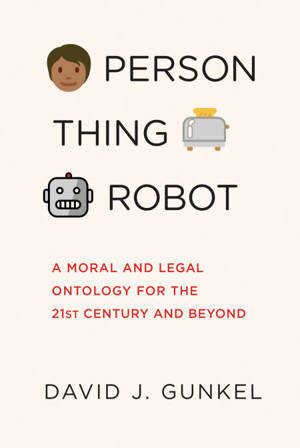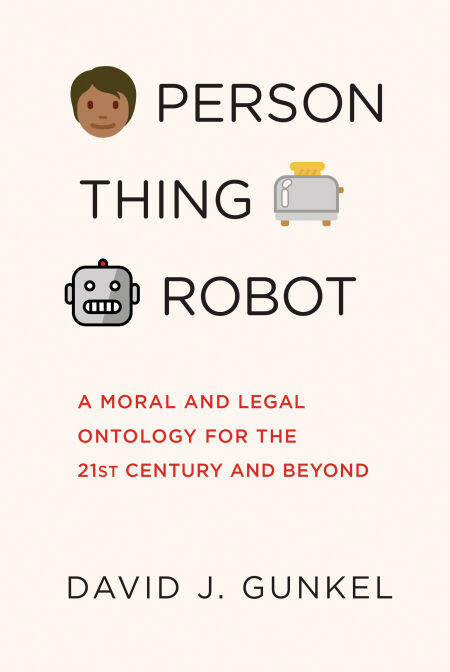
Bedankt voor het vertrouwen het afgelopen jaar! Om jou te bedanken bieden we GRATIS verzending (in België) aan op alles gedurende de hele maand januari.
- Afhalen na 1 uur in een winkel met voorraad
- In januari gratis thuislevering in België
- Ruim aanbod met 7 miljoen producten
Bedankt voor het vertrouwen het afgelopen jaar! Om jou te bedanken bieden we GRATIS verzending (in België) aan op alles gedurende de hele maand januari.
- Afhalen na 1 uur in een winkel met voorraad
- In januari gratis thuislevering in België
- Ruim aanbod met 7 miljoen producten
Zoeken
Person, Thing, Robot E-BOOK
A Moral and Legal Ontology for the 21st Century and Beyond
David J. Gunkel
E-book | Engels
€ 44,35
+ 44 punten
Uitvoering
Omschrijving
Why robots defy our existing moral and legal categories and how to revolutionize the way we think about them.
Robots are a curious sort of thing. On the one hand, they are technological artifacts—and thus, things. On the other hand, they seem to have social presence, because they talk and interact with us, and simulate the capabilities commonly associated with personhood. In Person, Thing, Robot, David J. Gunkel sets out to answer the vexing question: What exactly is a robot? Rather than try to fit robots into the existing categories by way of arguing for either their reification or personification, however, Gunkel argues for a revolutionary reformulation of the entire system, developing a new moral and legal ontology for the twenty-first century and beyond.
In this book, Gunkel investigates how and why efforts to use existing categories to classify robots fail, argues that “robot” designates an irreducible anomaly in the existing ontology, and formulates an alternative that restructures the ontological order in both moral philosophy and law. Person, Thing, Robot not only addresses the issues that are relevant to students, teachers, and researchers working in the fields of moral philosophy, philosophy of technology, science and technology studies (STS), and AI/robot law and policy but it also speaks to controversies that are important to AI researchers, robotics engineers, and computer scientists concerned with the social consequences of their work.
Robots are a curious sort of thing. On the one hand, they are technological artifacts—and thus, things. On the other hand, they seem to have social presence, because they talk and interact with us, and simulate the capabilities commonly associated with personhood. In Person, Thing, Robot, David J. Gunkel sets out to answer the vexing question: What exactly is a robot? Rather than try to fit robots into the existing categories by way of arguing for either their reification or personification, however, Gunkel argues for a revolutionary reformulation of the entire system, developing a new moral and legal ontology for the twenty-first century and beyond.
In this book, Gunkel investigates how and why efforts to use existing categories to classify robots fail, argues that “robot” designates an irreducible anomaly in the existing ontology, and formulates an alternative that restructures the ontological order in both moral philosophy and law. Person, Thing, Robot not only addresses the issues that are relevant to students, teachers, and researchers working in the fields of moral philosophy, philosophy of technology, science and technology studies (STS), and AI/robot law and policy but it also speaks to controversies that are important to AI researchers, robotics engineers, and computer scientists concerned with the social consequences of their work.
Specificaties
Betrokkenen
- Auteur(s):
- Uitgeverij:
Inhoud
- Aantal bladzijden:
- 246
- Taal:
- Engels
Eigenschappen
- Productcode (EAN):
- 9780262375238
- Verschijningsdatum:
- 4/09/2023
- Uitvoering:
- E-book
- Beveiligd met:
- Adobe DRM
- Formaat:
- ePub

Alleen bij Standaard Boekhandel
+ 44 punten op je klantenkaart van Standaard Boekhandel
Beoordelingen
We publiceren alleen reviews die voldoen aan de voorwaarden voor reviews. Bekijk onze voorwaarden voor reviews.









